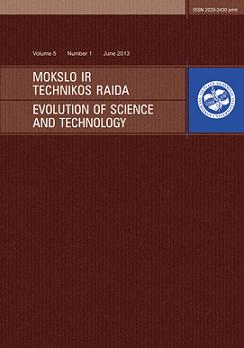Die bedeutung der erstmaligen ausbildung von lehrern auf hochschulniveau im gebiet des heutigen Lettland an der polytechnischen schule und am polytech
The importance of teacher training at riga polytechnic school
Author(s): Alīda ZigmundeSubject(s): History
Published by: Vilnius Gediminas Technical University
Keywords: Riga Polytechnic Institute; education of teachers.
Summary/Abstract: In 2012, Riga Technical University (RTU) – the oldest technical University in Latvia and the oldest institution for higher technical education in the Baltic States – celebrates the 150th anniversary. Riga Technical University was founded in 1862 as Riga Polytechnic School, which was reorganised into Riga Polytechnic Institute in 1896. From the very start it has been known for education of engineers and state servants. On the other hand, this institution for higher technical education also engaged in education of teachers of natural sciences and technical subjects to be taught at vocational schools and other institutions of technical education, such as polytechnic schools. Neither Riga Polytechnic School, no Riga Polytechnic Institute had a department for education of future teachers or a required study programme. Only one of the goals of the programme of the Department of Technical Chemistry for study-years 1868/69 and 1869/70 specified education of teachers for natural sciences. However, students of the aforementioned study programme were awarded diplomas that did not specify their teaching qualification or competence to teach such subjects as mathematics or natural sciences. Research suggests that a large number of alumni worked as teachers at middle-, commerce-, high- and vocational schools or even universities. There are numerous examples of alumni of Riga Polytechnic Institute working as teachers. They worked at universities in Bonn, Danzig, Dnepropetrovsk, Dresden, Göttingen, Irkutsk, Ivanovo- Vosnesensk, Karlsruhe, Kaunas, Kiev, Lvov, Moscow, Tallinn, Tomsk, Warsaw and many at the University of Latvia which was founded in 1919. They worked at different schools in Russia (Eriwan, Jekaterinburg, Kasan, Lodz, Odessa, Orl, Polock, Novorossijsk, Sankt Petersburg, Simbirsk, Tallinn, Tbilisi, Tomsk, Riga, Vilnius, Kaunas, Mažeikiai), China (Beijing), Finland, Berlin, London and even Brazil. Alumni functioned as teachers, professors, school directors and even university rectors. Some worked as Ministers of Education of Latvia, Lithuania and Poland. Many of them authored textbooks for students of universities and vocational schools. Many professors and associate professors of the Institute had a second job as a teacher at different schools in Riga or were active in the administration of educational institutions. These events were important for the development of pedagogy in Latvia and especially on the level of university education. The tradition of teacher training continues. Although diplomas awarded to graduates of RTU still don’t specify a qualification of a teacher, students receive education centred abound pedagogy. The Institute of Humanities at the RTU offers courses in pedagogy. Consequently, RTU continues with the traditions of the Riga Polytechnic School and the Riga Polytechnic Institute.
Journal: Mokslo ir technikos raida
- Issue Year: 5/2013
- Issue No: 1
- Page Range: 22-33
- Page Count: 12
- Language: German

